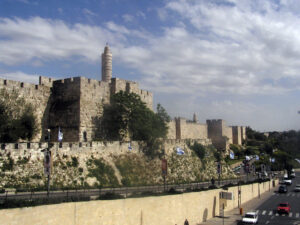
KFAR SABA, Israel — Michal and I recently returned from a mini-vacation in Jerusalem, which featured the annual Jerusalem Film Festival. While much of Europe and the U.S. is sweltering, Israel is “enjoying” its usual hot summer weather, with no rain expected until the end of September or early October. So, every day is about 90 degrees and sunny, now and for the next few months.
Jerusalem is a bit different. It’s just as hot during the day as in Kfar Saba, but with no humidity because of its 3,000 ft elevation. In addition, the nights are quite pleasant, sometimes requiring a sweater or even a light jacket.
In the late 19th century, when Palestine was part of the rapidly declining Ottoman Empire, there was much support for establishing a railway from Jaffa port to Jerusalem. Among the supporters were the famous architect and archaeologist Dr. Konrad Schick and philanthropist Moshe (Moses) Montefiore. European countries had seriously undermined Ottoman control by then, so Montefiore appealed to the British as well as the Ottoman authorities for a permit to construct a railroad line, but his efforts failed for political and economic reasons.
The first train to Jerusalem was eventually commissioned by banker and businessman Yosef Navon and the rail station was completed in 1892. The train trip from Jaffa took just 3 hours, a huge improvement over the horse and carriage journey up the mountain. Today, it’s a 35-minute trip from Tel Aviv/Jaffa, with a stop at Ben Gurion Airport on the way.
We chose the deluxe Orient Hotel for our two-night accommodation, a recent addition to the Isrotel hotel chain’s Exclusive Collection. Built around two expertly preserved Templar Buildings dating to 1882 and 1883, the hotel complex features 243 rooms and suites, some of them in the two original structures. Besides a very comfortable room, we especially enjoyed the bounteous breakfasts and the rooftop “infinity” pool area, which included an adjacent bar and lounge as well as a phenomenal view of the Old City and modern Jerusalem.
We’ve been attending the Film Festival for years, which is always held in July. Like most film festivals, it’s very hard to choose which films to see. We decided to pick several days at random which fit our schedule, and then to choose films playing on those days. That meant that we’d have a varied selection of films, which ultimately consisted of five feature films and one documentary.
Later that day we saw “Showing Up,” an American film starring Michelle Williams. It’s about a sculptor preparing to open a new show amidst the daily dramas of family and friends. It was described as a “vibrant and captivatingly funny portrait of a sculptor preparing to open a new show, who must balance her creative life with the daily dramas of family and friends. I characterize it as a boring, unfunny version of a Jerry Seinfeld episode about nothing. Yet this film competed for the Cannes Palme d’Or, which typifies for me how the vaunted Cannes film festival, and many others, are skewed. My rating: 2/5, which was generous.

The next morning we had our first chance to see a newly renovated museum which is a highlight of the Old City. “Located at the Jaffa Gate entrance to the Old City, the Tower of David Jerusalem Museum resides within the ancient citadel, once the fortress defending the city. Today, it stands as one of Israel’s prominent cultural institutions and Jerusalem’s official museum, intertwining the historical narrative of Jerusalem with its significance to Judaism, Christianity, and Islam.” (Source)
The Tower’s renovations are complete except for the new entrance and cafe. Its large archaeological garden has been revitalized, additional archaeological excavations have been unveiled, and there are 10 galleries for the new permanent exhibition. These provide a unique experience by combining authentic artifacts and technology, creativity and innovation. The museum is open seven days a week. Before returning to the Cinematheque we stopped for lunch in the adjacent Mamilla pedestrian mall. There we met our close friends from “back home,” Sarah Lynn (from Ventnor) and Ami (a former teacher at the Hebrew Academy). They now live in Jerusalem, with half their kids living in the U.S. and the others here.
That day’s films were an improvement over the previous day. We first saw “The Origin of Evil,” a second French film, in which a former convict on the verge of financial collapse attempts to reconnect with her wealthy father, whom she has never met. There are many twists and turns to the plot, with excellent acting along the way. This one I really enjoyed, especially with its surprising ending. My rating: 5/5
“Vera” was the first film of our third day at the festival. An Italian film, it is somewhat, if not wholly, autobiographical. The lead, Vera Gemma, portrays the eponymous actress, living off the diminishing estate of her (actual) famous actor/director father. Tired of her superficial life and relationships, Vera drifts through Roman high society. When her driver injures a child in a traffic accident in a rundown Roman suburb, she forms an intense relationship with an eight-year-old boy and his father. It doesn’t end well. This was a good performance with a lot of Roman scenery — always a plus. My rating: 4/5
Our final film was a terrific Israeli documentary. “The Spy Family” is about an Egyptian Muslim family that spied for Israel after the 1967 Six-Day War, was caught, and paid a heavy price—the father was hanged. Eventually they escaped to Israel, where the mother and three boys converted to Judaism. In Egypt the family is infamous, while in Israel their story was not included in our heroic military annals. The film publicizes this espionage affair and the family’s personal story. It was instigated by a grandson of the family who had no idea that he was descended from Egyptian grandparents. This was an excellent, engrossing film, enhanced by the attendance of the many Israeli descendants of the spies and their sons, who filled the stage after the presentation. My rating: 5/5
Attending a film festival is always a mixed bag. There will be good films, mediocre ones, and boring ones. But, three days with a stay in a luxurious hotel in Jerusalem is always a treat. After the last film, we had a late dinner with friends in an excellent restaurant opposite the Old City walls: The Eucalyptus, whose famous chef Moshe Basson serves modern interpretations of biblical cuisine.
Steve Kramer is a freelance writer based in Kfar Saba. He may be contacted via steve.kramer@sdjewishworld.com